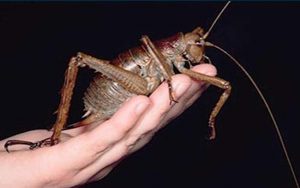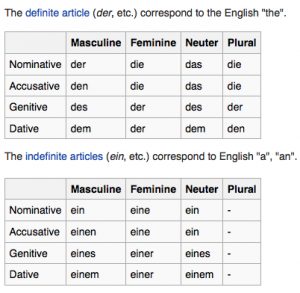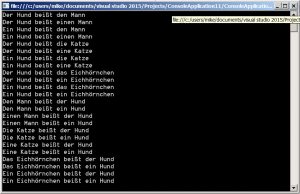Der Hund beißt den Mann
Embedded deep in the psyche of kiwis my vintage is a fear two things: a) the ‘Murder House’, a place where en-masse dental nurses filled more than just the milk-teeth of children with amalgam using low powered drills and a grin. Secondly b) the weta, a sort of horrific cross between a cricket and something out of the Alien movie trilogy. To this day I will not put my foot into a gumboot for fear of an opportunistic lurking weta. I also don’t care whether the weta is indigenous to New Zealand (that by definition means it must be wonderful), isn’t found outside New Zealand and I live in the UK, it is a creature to be feared and I’m not taking the chance!
The web is littered with photographs of the weta. I include two below. My adrenalin levels are already elevated!
I am slowly learning German. I have three basic impediments, a) I work throughout the day, evenings, and weekends, and there is little spare time to efficiently learn the language, b) I am learning German from English textbooks and the web [it would seem much more sensible to learn German in German (sic) in Germany, not learn German from English books from the not-to-distant UK], and c) finding a native German speaker to practice with, to chat over a coffee or beer with after work, and keep what I have recently learned at the forefront of my mind.
Very early on in my German language discovery was the realisation that my English grammar wasn’t up to scratch. I am having to relearn a lot of English grammar, properly, grammar that was drilled (oh – that dental nurse anxiety is cropping up again) into me at school; the subject of the sentence, the direct object, the indirect object, verbs, nouns, prepositions, adverbials, pronouns, adjectives, subjunctives, and so on.
A very basic sentence, in English, starts off with the subject, the verb, and then a bit more. For example, “The dog bites the man”. Unlike “The dog bites the man”, the sentence “The man bites the dog” is newsworthy as the meaning is so different (and unusual). In the sentence “The dog bites the man”, the subject of the sentence is the dog, and the direct object the man; in the sentence “The man bites the dog”, the subject of the sentence is the man, and the direct object the dog. Changing the noun order around changes the meaning of the sentence in English.
I have not randomly chosen the sentence “The dog bites the man”. It is a sentence that exists in many citations that introduce German article declension. I do not know whether dogs biting men is embedded in the German psyche, as are the weta and Murder House with New Zealanders, but I suspect it is the case. Even if it isn’t, it makes me want to giggle a bit to think it might.
In German Nouns have Gender, a degree of cardinality (singular or plural), and case. A dog (Hund) is masculine, as is a man (Mann) so the definitive form of a dog and a man is der Hund and der Mann, so if the verb “bites” is “beißt”, then the sentence “The dog bites the man” can be translated into German as “Der Hund beißt der Mann” – right? Nope.
Grammar in German is a big thing, and the direct translation of this sentence, “The dog bites the man”, is one of
- Der Hund beißt den Mann.
- Den Mann beißt der Hund.
depending on where you want to place the emphasis. Basically however, for someone that is German-second-language (me), take your pick. The key point in these two sentences is that the article [der (the)] is preserved for the subject of the sentence (the Nominative case) but has been declined for the direct object (the Accusative case) to den (also the). Once you get your head around this, and re-learn your English grammar as part of learning German, there is this appreciation that this grammar is both interesting and more sensible than English grammar. In the two sentences above, the German grammar makes it so clear that the dog is doing the biting and the man is being bitten.
Complete sets of German declension tables can be found all over the web, however I have included two tables below as I refer to them in C# and LINQ further down this article.
As mentioned, I have no one to practice with, and learning German for me is the occasional trip to Germany or, more often, sitting in front of a book or computer. To practice my German declension, in simple sentences devoid of plural nouns, and Genitive or Dative article declension, and using a small and very controlled set of verbs, I decided to autogenerate some sentences as a way of repetition – to ensure, without thinking and by rote, I use the correct grammar every time. I have resorted to LINQ, I always do, and I appreciate that this is a personality fault but like NMR for synthetic organic chemists (I am merely a pretender to this throne now), it is my fallback first-choice technology.
Here is my code below, written a little more verbosely than necessary, as I intend to shoehorn in the Dative case too at some later stage.
using System;
using System.Collections.Generic;
using System.Linq;
namespace ConsoleApplication11
{
class Program
{
enum Gender { Masculine, Feminine, Neuter, Plural }
enum Case { Nominative, Accusative, Dative, Genitive }
enum Article { Definitive, Indefinite }
Dictionary<Tuple<Article, Case, Gender>, String> declensionTable = new Dictionary<Tuple<Article, Case, Gender>, String>
{
{ Tuple.Create(Article.Definitive, Case.Nominative, Gender.Masculine), "der" } ,
{ Tuple.Create(Article.Definitive, Case.Nominative, Gender.Feminine), "die" } ,
{ Tuple.Create(Article.Definitive, Case.Nominative, Gender.Neuter), "das" } ,
{ Tuple.Create(Article.Definitive, Case.Nominative, Gender.Plural), "die" } ,
{ Tuple.Create(Article.Definitive, Case.Accusative, Gender.Masculine), "den" } ,
{ Tuple.Create(Article.Definitive, Case.Accusative, Gender.Feminine), "die" } ,
{ Tuple.Create(Article.Definitive, Case.Accusative, Gender.Neuter), "das" } ,
{ Tuple.Create(Article.Definitive, Case.Accusative, Gender.Plural), "die" } ,
{ Tuple.Create(Article.Definitive, Case.Dative, Gender.Masculine), "dem" } ,
{ Tuple.Create(Article.Definitive, Case.Dative, Gender.Feminine), "der" } ,
{ Tuple.Create(Article.Definitive, Case.Dative, Gender.Neuter), "dem" } ,
{ Tuple.Create(Article.Definitive, Case.Dative, Gender.Plural), "den" } ,
{ Tuple.Create(Article.Definitive, Case.Genitive, Gender.Masculine), "des" } ,
{ Tuple.Create(Article.Definitive, Case.Genitive, Gender.Feminine), "der" } ,
{ Tuple.Create(Article.Definitive, Case.Genitive, Gender.Neuter), "des" } ,
{ Tuple.Create(Article.Definitive, Case.Genitive, Gender.Plural), "der" } ,
{ Tuple.Create(Article.Indefinite, Case.Nominative, Gender.Masculine), "ein" } ,
{ Tuple.Create(Article.Indefinite, Case.Nominative, Gender.Feminine), "eine" } ,
{ Tuple.Create(Article.Indefinite, Case.Nominative, Gender.Neuter), "ein" } ,
{ Tuple.Create(Article.Indefinite, Case.Nominative, Gender.Plural), null } ,
{ Tuple.Create(Article.Indefinite, Case.Accusative, Gender.Masculine), "einen" } ,
{ Tuple.Create(Article.Indefinite, Case.Accusative, Gender.Feminine), "eine" } ,
{ Tuple.Create(Article.Indefinite, Case.Accusative, Gender.Neuter), "ein" } ,
{ Tuple.Create(Article.Indefinite, Case.Accusative, Gender.Plural), null } ,
{ Tuple.Create(Article.Indefinite, Case.Dative, Gender.Masculine), "einem" } ,
{ Tuple.Create(Article.Indefinite, Case.Dative, Gender.Feminine), "einer" } ,
{ Tuple.Create(Article.Indefinite, Case.Dative, Gender.Neuter), "einem" } ,
{ Tuple.Create(Article.Indefinite, Case.Dative, Gender.Plural), null } ,
{ Tuple.Create(Article.Indefinite, Case.Genitive, Gender.Masculine), "eines" } ,
{ Tuple.Create(Article.Indefinite, Case.Genitive, Gender.Feminine), "einer" } ,
{ Tuple.Create(Article.Indefinite, Case.Genitive, Gender.Neuter), "eines" } ,
{ Tuple.Create(Article.Indefinite, Case.Genitive, Gender.Plural), null }
};
Tuple<Gender, String>[] nouns = new Tuple<Gender, String>[]
{
Tuple.Create(Gender.Masculine, "Hund"),
Tuple.Create(Gender.Masculine, "Mann"),
Tuple.Create(Gender.Feminine, "Katze"),
Tuple.Create(Gender.Neuter, "Eichhörnchen")
};
List<String> verbs = new List<String> { "beißt" /*, other verbs too */ };
private void Run()
{
var perms = from noun1 in nouns
from noun2 in nouns
from article1 in new Article[] { Article.Definitive, Article.Indefinite }
from article2 in new Article[] { Article.Definitive, Article.Indefinite }
from case1 in new Case[] { Case.Accusative, Case.Nominative }
from case2 in new Case[] { Case.Accusative, Case.Nominative }
from dt1 in declensionTable
from dt2 in declensionTable
from verb in verbs
where dt1.Key.Equals(Tuple.Create<Article, Case, Gender>(article1, case1, noun1.Item1))
where dt2.Key.Equals(Tuple.Create<Article, Case, Gender>(article2, case2, noun2.Item1))
where noun1.Item2 != noun2.Item2 //only interested where two different things are 'verbing'
where case1 != case2 //and one Nominative and one Accusative for correct grammar
/* just when dog is the subject - doing the biting! */ where ((noun1.Item2 == "Hund" && case1 == Case.Nominative) || (noun2.Item2 == "Hund" && case2 == Case.Nominative))
group noun1 by new { Sentence = $"{dt1.Value} {noun1.Item2} {verb} {dt2.Value} {noun2.Item2}" }
into s
select s.Key.Sentence.First().ToString().ToUpper() + s.Key.Sentence.Substring(1);
foreach (var x in perms)
Console.WriteLine(x);
}
static void Main(string[] args)
{
new Program().Run();
}
}
}
So, providing I understand these declension tables correctly, my little program will produce a small set of example sentences where a/the dog (always the subject of the sentence) is biting a/the man, cat, or squirrel (always the object of the sentence), irrespective of the noun order. I hope I understand this, or there might be some serious egg on my face.
The output is:
What is weta translated into German? I have no idea, nor the noun gender. I do know however I fear a weta biting me more than a dog!
— Published by Mike, 12:46:12 18 October 2016
Archive
By Month: November 2022, October 2022, August 2022, February 2021, January 2021, December 2020, November 2020, March 2019, September 2018, June 2018, May 2018, April 2018
Categories
Apple, C#, Databases, Faircom, General IT Rant, German, Informatics, LINQ, MongoDB, Oracle, Perl, PostgreSQL, SQL, SQL Server, Unit Testing, XML/XSLT




Leave a Reply